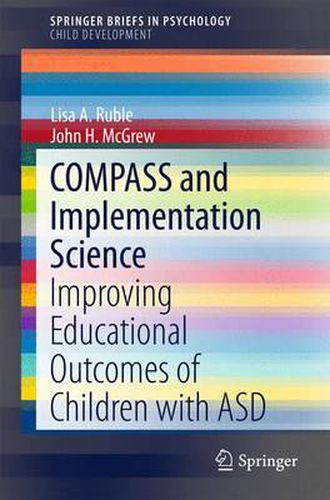Readings Newsletter
Become a Readings Member to make your shopping experience even easier.
Sign in or sign up for free!
You’re not far away from qualifying for FREE standard shipping within Australia
You’ve qualified for FREE standard shipping within Australia
The cart is loading…






This title is printed to order. This book may have been self-published. If so, we cannot guarantee the quality of the content. In the main most books will have gone through the editing process however some may not. We therefore suggest that you be aware of this before ordering this book. If in doubt check either the author or publisher’s details as we are unable to accept any returns unless they are faulty. Please contact us if you have any questions.
This Brief examines COMPASS - the Collaborative Model for Promoting Competence and Success - a consultation-based intervention specialized for children with Autism Spectrum Disorder (ASD). Based on the Evidence-Based Practices in Psychology (EBPP) framework, the volume describes the processes that strengthen the expert support relationships between consultant and teacher (i.e., implementation) and between teacher and student (i.e., intervention). In addition, the Brief addresses how consultation methods work within COMPASS, with teachers learning from consultants’ implementation methods to tailor instructions that are specific to students’ educational and personal factors. This unique framework corresponds with current, widespread research and aims to provide more effective educational services for students with ASD during their crucial formative years.
Topics featured in this text include:
COMPASS practice outcome based on idiographic assessment and measures of quality.
Evidence for the efficacy of COMPASS. COMPASS implementation quality. COMPASS intervention quality and active ingredients. Teacher and student internal and external factors impacting COMPASS.
COMPASS and Implementation Science is a must-have resource for clinicians, scientist-practitioners, researchers, and graduate students in the fields of child and school psychology, behavioral therapy, and social work as well as rehabilitation, special education, and speech pathology.
$9.00 standard shipping within Australia
FREE standard shipping within Australia for orders over $100.00
Express & International shipping calculated at checkout
This title is printed to order. This book may have been self-published. If so, we cannot guarantee the quality of the content. In the main most books will have gone through the editing process however some may not. We therefore suggest that you be aware of this before ordering this book. If in doubt check either the author or publisher’s details as we are unable to accept any returns unless they are faulty. Please contact us if you have any questions.
This Brief examines COMPASS - the Collaborative Model for Promoting Competence and Success - a consultation-based intervention specialized for children with Autism Spectrum Disorder (ASD). Based on the Evidence-Based Practices in Psychology (EBPP) framework, the volume describes the processes that strengthen the expert support relationships between consultant and teacher (i.e., implementation) and between teacher and student (i.e., intervention). In addition, the Brief addresses how consultation methods work within COMPASS, with teachers learning from consultants’ implementation methods to tailor instructions that are specific to students’ educational and personal factors. This unique framework corresponds with current, widespread research and aims to provide more effective educational services for students with ASD during their crucial formative years.
Topics featured in this text include:
COMPASS practice outcome based on idiographic assessment and measures of quality.
Evidence for the efficacy of COMPASS. COMPASS implementation quality. COMPASS intervention quality and active ingredients. Teacher and student internal and external factors impacting COMPASS.
COMPASS and Implementation Science is a must-have resource for clinicians, scientist-practitioners, researchers, and graduate students in the fields of child and school psychology, behavioral therapy, and social work as well as rehabilitation, special education, and speech pathology.